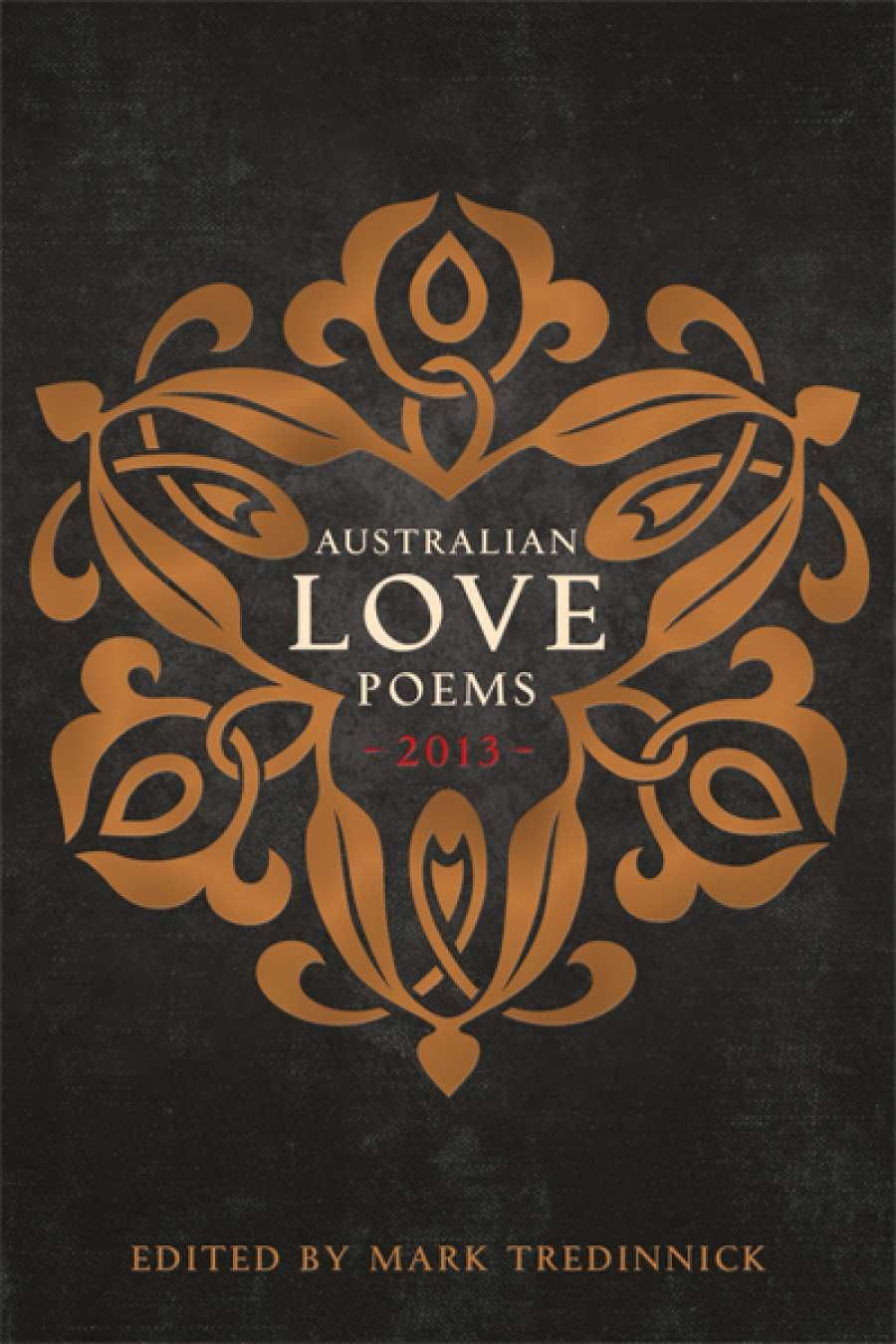
- Free Article: No
- Contents Category: Poetry
- Custom Article Title: Peter Kenneally reviews 'Australian Love Poems 2013' by Mark Tredinnick
- Custom Highlight Text:
Some things just don’t appear to go together, unless you are good at puzzles. A fox, a goose, and a bag of beans, for instance; or maybe a wolf, a goat, and a cabbage. Then there are Australia, love, and poetry. Australians and poetry can’t be left alone together, can they, and don’t expressions of love ...
- Grid Image (300px * 250px):

- Book 1 Title: Australian Love Poems 2013
- Book 1 Biblio: Inkerman & Blunt, $26.99 pb, 330 pp, 9780987540102
He is right, of course, up to a point. It is true that in many a fine but challenging poetry volume it is the moments of unmistakable emotion that provide a footing and a sense of direction for the reader. This collection, so unambiguous in its concerns, is almost unsettling, because you know in advance what every single poem is about. Exactly what aspect of love a given poem sees, and from which cultural or personal slant, takes longer to divine, but the book is free of the rudderlessness that afflicts so many anthologies, and yet is fabulously various. Tredinnick deserves great credit for this, and for his inspired idea to use lines from within poems as titles for the various sections (‘You and I sitting out the world’; ‘I’ve been drunk with you for millennia’). Such a simple notion, but it makes the book into a creation of the poems, and it is almost a sensual moment when you come across such a line within its poem.
Naturally, even inevitably, the sections deal with falling in love, passion, partnership, unfaithfulness, loss, grief, more or less in that order. Nearly all books of love poetry do – Dorothy Porter’s posthumous Love Poems being the gold standard – and it would be perverse not to. So Tredinnick’s selection gets off to a vibrant start, full of joyful play and a kind of desperation, as in Jodie Lee Martin’s ‘Love Affair’: ‘I’m having a love affair with my neighbour / but I don’t think she knows / I fondle her misdirected mail / And redeliver it with pleasure and / A dash of scented oil.’
‘...if you want to get close to love, analyse it, capture it, only poetry will serve.’
However, because poets take poetry (and/or love and/or themselves) entirely seriously, it’s not a romantic collection, but moves with a deliberate, antique passion, even when aroused, ‘… when my tugging oil-slick fist / has you tumescent and butting at my lips; / when every nerve’s erect as Spinifex / and our skins fluoresce like sand at dawn / on the kind of beach you find up north- / but I digress / the way we do in sex / where the metaphors overlap and mix.’ Fearless, shameless, knowing, those lines from Lisa Jacobson sum up poetry’s challenge – how much are you prepared to see? Brecht, in his last poem, wrote: ‘when I say what things are like, people’s hearts should be torn in two.’ So they should, and Australian Love Poems, rather surprisingly, says what things are like. There is some dissembling – rather a lot of classical and historical camouflage, a few Robert Herrick/Andrew Marvell moments, but mostly a clear, probing gaze, falling on contentment or abandonment, possession or loss.
One thing is clear from this book: if you want to get close to love, analyse it, capture it, only poetry will serve. Both Tredinnick and Ward, in writing about the book, flounder prosaically around the topic of love and poetry, and say various things about both that didn’t need saying and aren’t confirmed in any of the actual poems. There is also an outbreak of wishful thinking about spreading poetry ‘far beyond poetry’s borders’, and a desire for the book to be a resource of ‘Australian love’ material for when people get married, or someone dies, and a poem is felt necessary. Ward has said that she wanted ‘to create books that people could turn to when they are in love and lost for words and want an Australian voice to guide them’. This is either a noble aim or a deeply depressing one – I cannot tell which – and raises the ghastly question of how Australian the poetry in the book is and what ‘Australian love’ means. Thankfully, such questions are always rhetorical.
These are minor annoyances, though. What matters is that visually the book is elegant, simple, and apt, and the poems generously set; that the use of different verse forms constantly surprises, and hardly ever goes astray or becomes heavy-footed; that the array of contexts and metaphors for love is endless. There is, towards the end of the book, a lingering sadness, as everyone seems to die, leave, or lose their love, and poetry has its own, self-fulfilling solutions: ‘Love, when rain has gathered / when rain is falling, think of me and whisper / nothing but rhymes for poems that don’t exist’ (Philip A. Ellis). But the sadness is real: it isn’t a Four-Weddings-and-a-Funeral-Auden-poem confection, and the emotion in it is exactly the same as in the wanting, wooing, fucking, settling, sharing, befriending poems. You fall in love with someone; you watch them leave, or you leave; you watch them die; life goes on: that is what things are like.


Comments powered by CComment